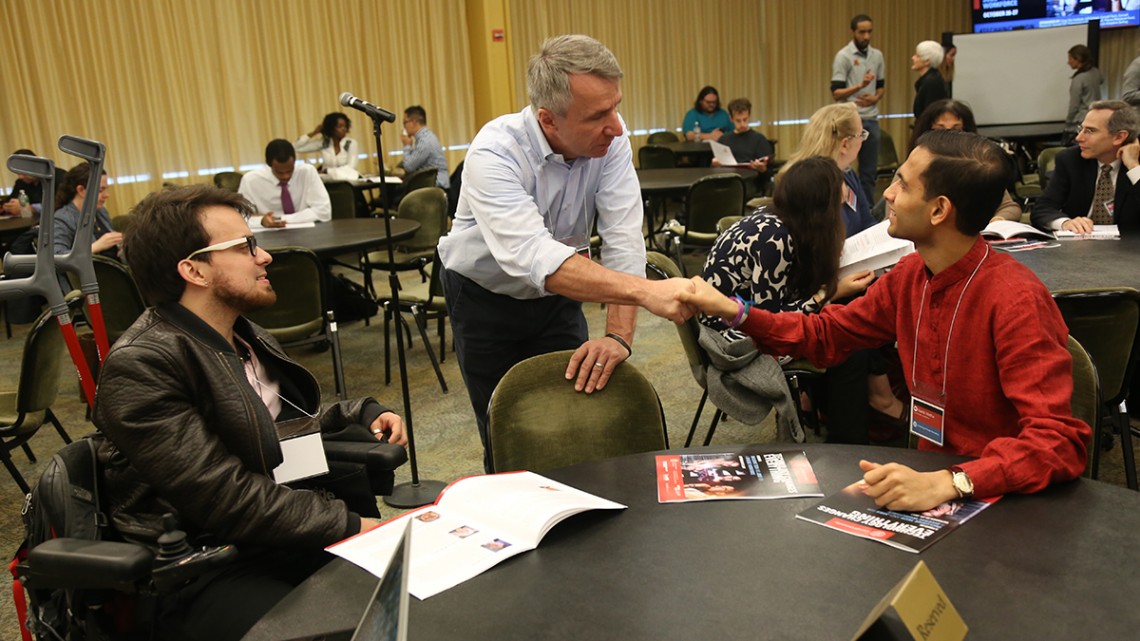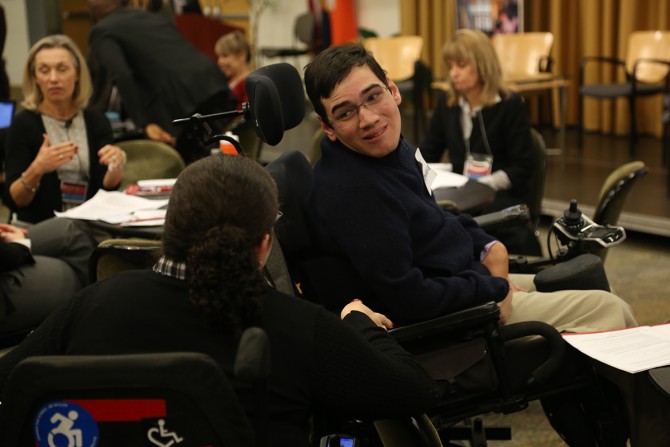
From left, Diego Mariscal, CEO and chief disabled officer of 2Gether-International; Paolo Gaudiano, executive director of Quantitative Studies of Diversity and Inclusion at the City College of New York and founder of Aleria; and Naitik Mehta, CEO and co-founder of NextBillion.org, speak at the K. Lisa Yang and Hock E. Tan Institute on Employment and Disability Institute’s “Technology Changes Everything” forum.
ILR School forum: Tech promises jobs for people with disabilities
By Mary Catt
Increasing technology-sector jobs for people with disabilities are rich with possibility, packed with potential and already showing business benefits.
So said Pat Romzek – an executive who works with the LifeChanger project at Cisco, and the father of a son with a disability – in his keynote at the ILR School’s Oct. 26-27 forum, “Technology Changes Everything: Innovating to Include People of All Abilities in a More Diverse Workforce.”
The event focused on improving employment outcomes for people with disabilities in the tech sector and promoting inclusive design, which enables people of all abilities to access web-based products and services in tech-intensive workplaces.
Led by the K. Lisa Yang and Hock E. Tan Institute on Employment and Disability, the forum at Baruch College in New York City drew nearly 200 participants.
Speakers from technology companies, nonprofits, the disability community, government, academia and startups discussed promoting tech sector employment, training and entrepreneurship among people with disabilities, along with related recruitment and hiring issues.
Romzek began his talk with the startling statistics many in the disability community know well. Two-thirds of people with disabilities of working age are jobless. Those who do have jobs are usually underemployed, underpaid and live in poverty.
Those outside the disability community, though, “don’t often realize how awful the problem is,” Romzek said. “More attention is paid to homeless dogs.”
But incrementally, he said, opportunities for people with disabilities are improving in some corners of the tech sector. Executive-level leadership and commitment that leverages the business case for employing people with disabilities – who are almost always high-productivity workers – are factors driving success.
He noted that success by workers with disabilities is driven by character traits, such as integrity and empathy, that overcome the lack of education or work history most applicants with disabilities have been denied, he said.
“Be the Rosetta Stone. Hire people with disabilities even if they don’t [yet] have the skills,” which can be developed to match demand, he said. “You can change the world. It’s complex, but there is a way forward.”
Susanne Bruyère, director of the Yang-Tan Institute, said the forum is an example of radical collaboration across Cornell.
“We need to be thinking about radical new approaches to facilitating needed changes to take advantage of this largely untapped labor force. Technology and the tech industry is offering us these opportunities across a number of fronts,” said Bruyère, ILR School professor of disability studies. “Tech employers are accelerating positive outcomes for workers with disabilities and helping close employment and economic gaps,” she said. “Tech’s growth and partnership with the disability community is beginning to move job barriers for thousands each year. Embracing neurodiversity is an exciting paradigm shift. Today, with increasing appreciation of the value diversity brings to business, employers are re-examining their views and seeing how this additional dimension to diversity can be great for business.”
Aimed at technology companies, financial and professional services firms, policymakers, educators and workforce development professionals, the forum drew individuals with disabilities, human resources leaders and New York Daily News journalist Ginger Adams Otis, who spoke as a panelist.
Event sponsors included Cornell Tech, Computing and Information Sciences, Entrepreneurship at Cornell, the Office of the Vice Provost for Research and ILR’s Pierce Memorial Fund.
Mary Catt is assistant director of communications at the ILR School.
Media Contact
Get Cornell news delivered right to your inbox.
Subscribe